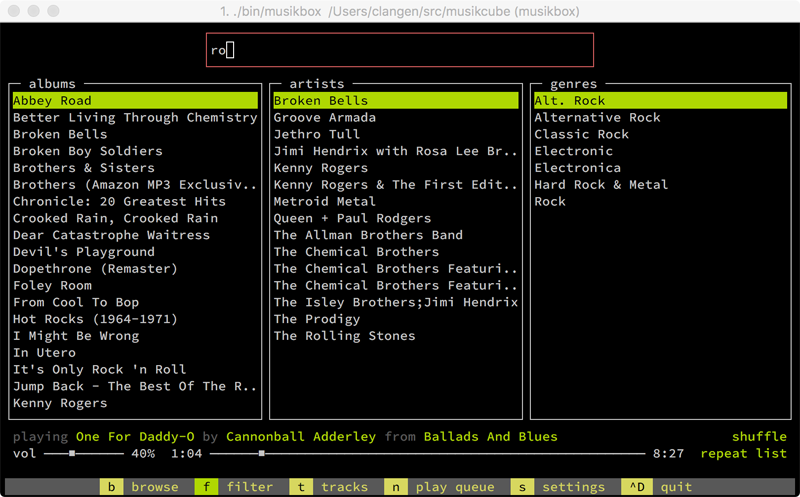# musikcube a cross-platform audio engine and player written in C++. # musikbox a curses frontend to musikcube. musicbox compiles and runs easily on Windows, OSX and Linux. it looks something like this on windows:  and this on osx:  and linux:  # compiling ## windows - grab the [Visual Studio 2015 Community Edition](https://www.visualstudio.com/en-us/downloads/download-visual-studio-vs.aspx) and install the C++ compiler and tools. the 32-bit compiler is currently used. - clone the musikcube sources: `git clone https://github.com/clangen/musikcube.git` - install the [32 bit version of boost 1.60](https://sourceforge.net/projects/boost/files/boost-binaries/1.60.0/boost_1_60_0-msvc-14.0-32.exe/download). ensure it shares the same parent directory with musikcube. e.g: `c:\src\musikcube` and `c:\src\boost_1_60_0` -- the project's solution will reference it via relative path. - open `musikcube.sln` and build/run. ## mac you'll need [homebrew](http://brew.sh/) to install the required dependencies. ### automatic - `brew tap clangen/musikbox` - `brew install musikbox` - `musikbox` ### manual - `brew install cmake boost libogg libvorbis flac faad2` - `git clone https://github.com/clangen/musikcube.git` - `cd musikcube` - `cmake .` - `make` - `cd bin` - `./musikbox` ## linux - install the following libraries and their development packages: `cmake boost libogg vorbis flac faad2 ncurses zlib asound pulse` - `git clone https://github.com/clangen/musikcube.git` - `cd musikcube` - `cmake .` - `make` - `sudo make install` - `musikbox` ## keyboard shortcuts the hotkeys listed below can generally be used at any time; however, if an input field is focused some may not work. you can enter command mode by pressing `ESC`, which will highlight the bottom command bar and accept all hotkeys. command mode may be deactivated by pressing `ESC` again. you may also change hotkeys by editing `~/.mC2/hotkeys.json` and restarting the app. a hotkey tester is provided in the settings screen. - `TAB` select next window - `SHIFT+TAB` select previous window - `~` switch to console view - `a` switch to library view - `s` switch to settings view - `i` volume up 5% - `k` volume down 5% - `m` toggle volume mute - `j` previous track - `l` next track - `u` back 10 seconds - `o` forward 10 seconds - `v` show / hide visualizer - `r` repaint the screen - `.` toggle repeat mode (off/track/list) - `,` (un)shuffle play queue - `CTRL+p` pause/resume (globally) - `CTRL+x` stop (unload streams, free resources) - `CTRL+d` quit and a couple hotkeys that are specific to the library view: - `b` show browse view - `n` show play queue - `f` show album/artist/genre search - `t` show track search - `1` browse by artist - `2` browse by album - `3` browse by genre - `x` jump to playing artist/album/genre in browse view - `SPACE` pause/resume *important*: on OSX make sure you configure your terminal emulator to treat your left alt key as "+Esc" or "Meta". # sdk musikcube is built around its own SDK interfaces. they're still in the process of being cleaned up and slimmed down. you can see what they look like here: https://github.com/clangen/musikcube/tree/master/src/core/sdk